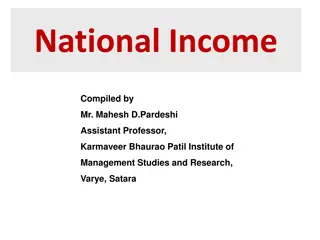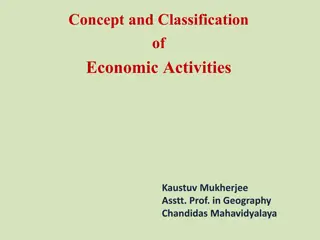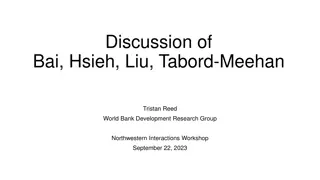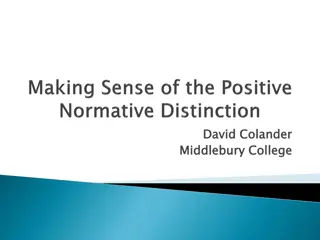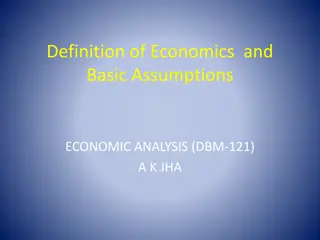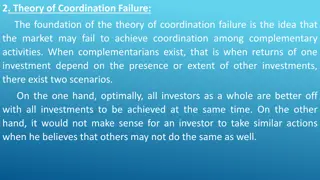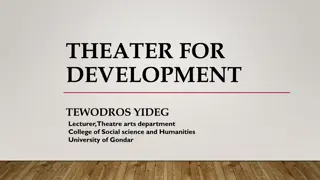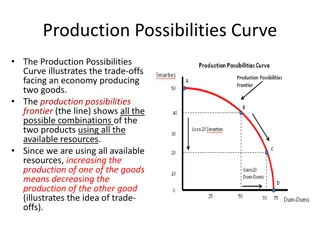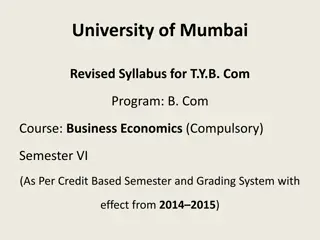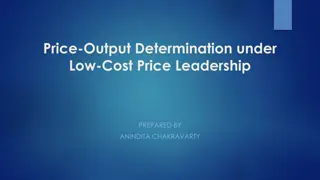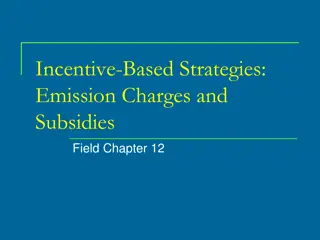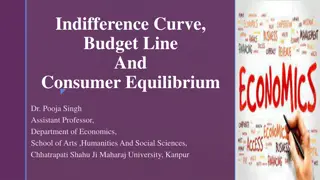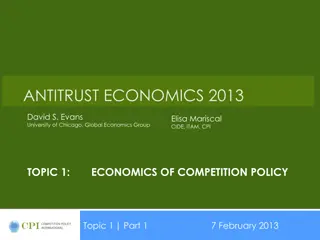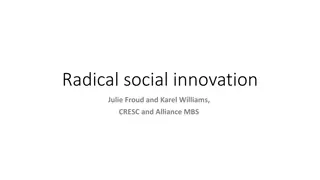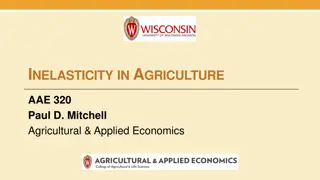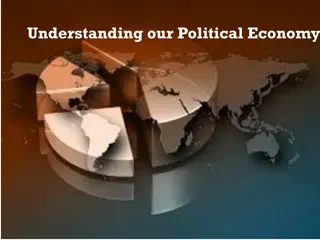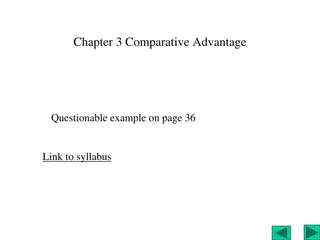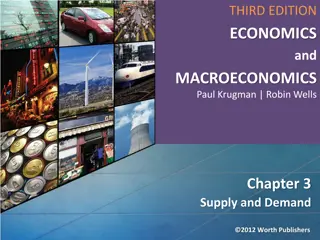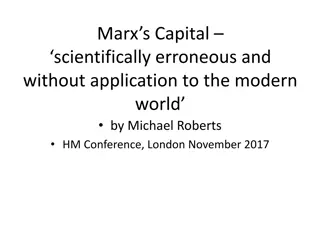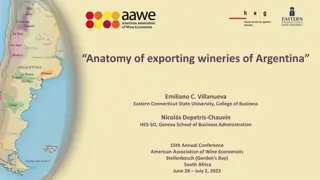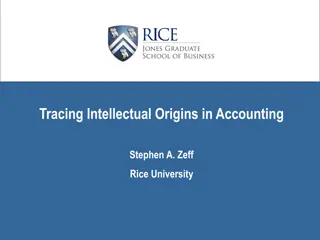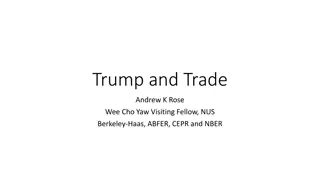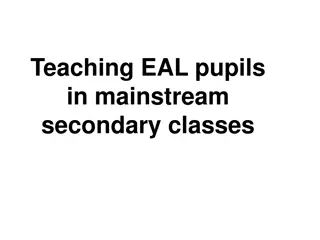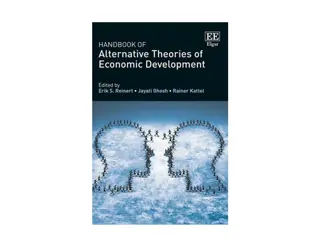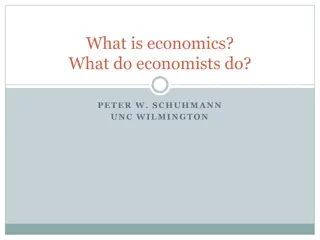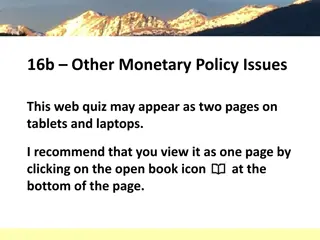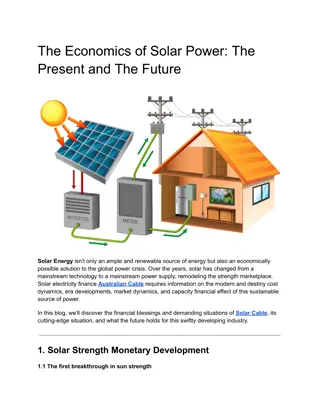Understanding National Income and Its Importance in Economics
National income is a crucial measure of the value of goods and services produced in an economy. It provides insights into economic growth, living standards, income distribution, and more. Concepts such as GDP, GNP, Personal Income, and Per Capita Income help in understanding the economic health of a
5 views • 14 slides
Government Economic Service: Assistant Economist Scheme Overview
Welcome to the Q&A session providing an overview of the Government Economic Service (GES) and details about the Assistant Economist Scheme application process. Learn about the benefits of working in the Civil Service, the role of economists in government, and the message from Sam Beckett, Head of th
4 views • 18 slides
Understanding Economic Activities and Their Classification
Economic activities encompass the production, distribution, and consumption of goods and services within a society. Economists classify economic activities into four main sectors: Primary, Secondary, Tertiary, and Quaternary, each with distinct roles and functions. The Primary Sector involves raw ma
7 views • 12 slides
Market Structures
Economists analyze market structures to determine the level of competition among businesses in an industry. Perfect competition is an ideal model where many buyers and sellers exist, products are standardized, entry and exit into the market are easy, and buyers and sellers act independently to set p
0 views • 33 slides
Understanding Markets and Economic Structures
Markets play a crucial role in bringing buyers and sellers together for transactions. This article discusses the concept of markets, different types of markets in a capitalist economy, focusing on perfect competition. It outlines the features and conditions of perfect competition, emphasizing the im
2 views • 42 slides
Discussion of Randomized Experiments and Experimental Design Challenges
Randomized experiments face statistical power challenges due to rare outcomes and high variance. Stratifying randomization can help control for correlated residual variance based on baseline values of outcomes. Implications for applied economists include addressing attrition and treatment effect het
0 views • 6 slides
Understanding the Positive/Normative Distinction in Economics
Textbooks in economics often teach the Positive/Normative Distinction, where Positive Economics deals with facts and Normative Economics focuses on values and opinions. This distinction is a point of debate among scholars, with some arguing that values are intrinsic to all analysis. The debate also
0 views • 28 slides
Understanding Economics: Definitions and Basic Assumptions
Economics is a social science that examines how individuals, businesses, and governments allocate resources to satisfy unlimited wants in the face of scarcity. It involves decision-making processes and the study of human behavior in relation to the allocation of scarce resources. Basic assumptions l
0 views • 9 slides
Understanding the Theory of Coordination Failure in Markets
The theory of coordination failure explores how markets may struggle to achieve coordination among complementary activities, leading to suboptimal outcomes. It highlights scenarios where investors' actions depend on each other, emphasizing the role of government intervention to solve coordination is
2 views • 14 slides
Understanding Development Through Various Perspectives
Development is a complex concept encompassing societal capacity, individual well-being, and multi-dimensional improvements. Scholars like Gene Shackman, Octavio Paz, and Rodney offer diverse viewpoints on development, emphasizing social organization, growth, and material well-being. Key aspects of d
0 views • 47 slides
Understanding Production Possibilities Curve and Economic Growth
The Production Possibilities Curve illustrates trade-offs in an economy producing two goods, showing possible combinations using available resources. Efficiency on the curve means no way to make some better off without others worse off. Opportunity cost is the given-up production when increasing one
0 views • 5 slides
Understanding Key Concepts in Economic Geography
Economic Geography is a sub-discipline that utilizes a geographical approach to analyze the spatial distribution of economic activities at various scales. It focuses on the location of economic activities and their relationship with the environment, encompassing primary, secondary, and tertiary sect
1 views • 20 slides
Theories of International Trade: Comparative Cost Theory and Absolute Cost Advantage
This content discusses the classical theories of international trade, focusing on Comparative Cost Theory and Absolute Cost Advantage introduced by economists like Adam Smith and David Ricardo. The assumptions, principles, and examples related to these theories are highlighted, emphasizing the conce
2 views • 41 slides
Understanding Say's Law of Markets in Economics
Say's Law of Markets, a theory from classical economics, posits that the ability to purchase is dependent on the ability to produce and generate income. This principle highlights that production drives economic growth, emphasizing the importance of encouraging production over consumption. The law re
0 views • 9 slides
Supporting Children with SEND in Mainstream Early Years Settings
Families benefit from tailored support sessions in mainstream early years settings, aiming to bridge the gap between mainstream and special education. Flexibility in session duration and digital support can enhance accessibility for working parents. Training for mainstream staff is crucial, and a ba
0 views • 10 slides
Economic Perspectives on Malaria Control and Elimination
Analyzing malaria control and elimination from an economic standpoint is crucial for understanding the long-term health outcomes, cost savings, operational strategies, funding gaps, and wider economic consequences of the disease. By examining the correlation between malaria and poverty, exploring fu
4 views • 21 slides
Price-Output Determination Under Low-Cost Price Leadership
Economists have developed models on price-output determination under price leadership, with assumptions about leader and follower behavior. In this scenario, two firms, A and B, with equal market share and homogeneous products, navigate pricing strategies based on cost differentials. Firm A, with lo
1 views • 7 slides
Implementing Emission Charges and Subsidies for Efficient Pollution Control
Incentive-based strategies like emission charges and subsidies play a crucial role in achieving efficient pollution control. Environmental economists advocate for incorporating such policies to enhance cost-effectiveness. By using an administered price system, firms can be incentivized to reduce emi
1 views • 42 slides
Understanding Indifference Curve, Budget Line, and Consumer Equilibrium
Indifference curves and budget lines are essential concepts in economics to analyze consumer behavior and preferences. Dr. Pooja Singh, an Assistant Professor at Chhatrapati Shahu Ji Maharaj University, Kanpur, explains how indifference curves represent different combinations of goods that offer the
0 views • 9 slides
Understanding Supply and Demand: Key Concepts in Economics
Prices in markets are determined by the forces of supply and demand, where changes in one or both factors impact price levels. This concept is essential in economics to comprehend the dynamics of pricing, production, and resource allocation within an economy. The economy revolves around the efficien
0 views • 20 slides
Future Homes: From Ambition to Mainstream - Challenges and Opportunities
Professor Rose Gilroy discusses the transition of future homes from ambition to prototype to mainstream, addressing the challenges posed by demographic changes, climate change, and the need for digital innovation in housing. With insightful data on the aging population, economic impacts, and environ
0 views • 20 slides
Economics of Competition Policy in Antitrust Practice
Understanding the importance of economics in antitrust practice is crucial as it involves applying economic concepts like markets, competition, and market power. Economists play a significant role in developing case theories and evidence, making economics indispensable in dealing with competition ag
1 views • 38 slides
Experimental Investigation of Risk Perception in Wine Purchases
The American Association of Wine Economists' 10th Annual Conference delved into consumer behavior and perceived risk when buying wine. The study explored risk, uncertainty, ambiguity, and conflict in wine purchases, presenting preliminary findings on risk-taking behaviors. An experimental investigat
0 views • 26 slides
Radical Social Innovation and Pushback: A Critical Analysis
Challenging the mainstream 'feel-good' approach to social innovation, this analysis by Julie Froud and Karel Williams advocates for a radical practice requiring political struggle, mobilization, and financial/ecological viability. It critiques the undiscussed aspects of mainstream usage, emphasizing
0 views • 13 slides
Understanding Inelasticity in Agriculture
In agriculture, both supply and food demand exhibit relative inelasticity compared to other types of supply and demand. This inelasticity results in significant impacts on agricultural prices, farm income, and consumer spending on food. Factors contributing to the inelasticity include biological con
0 views • 11 slides
Unveiling the Economic Debate and Policy Evolution
Explore the historical context and key figures in the economic debate, including insights into theories from economists such as John Bates Clark and Mason Gaffney. Delve into discussions on factors of production, the concept of rent in economics, and the implications for tax systems. Discover the im
0 views • 27 slides
Understanding Comparative Advantage in Economics: Adam Smith and David Ricardo
Explore the concepts of absolute advantage versus comparative advantage as discussed by renowned economists Adam Smith and David Ricardo. Discover how free market principles, self-interest, and efficient resource allocation shape beneficial economic decisions. Delve into examples of comparative adva
0 views • 13 slides
Understanding Supply and Demand in a Competitive Market
This content delves into the concept of supply and demand in a competitive market as described by the renowned economists Paul Krugman and Robin Wells. It covers the basics of a competitive market, the dynamics of supply and demand curves, movements along curves, market equilibrium, and how prices a
0 views • 42 slides
Marx Versus Keynes: A Critical Examination of Economic Theories
Michael Roberts critiques Marx's Capital as scientifically erroneous and irrelevant to the modern world, contrasting it with Keynesian economics which questions the applicability of communist doctrine in contemporary society. The debate revolves around value theory, production, economic crises, and
0 views • 41 slides
The Vital Role of Religious Institutions in Supporting Immigrants
Religions and immigration are interlinked in modern societies, where religions play a significant role in providing services, defending rights, and supporting the social cohesion of immigrants. Mainstream religious institutions serve as key actors in offering assistance, advocating for migrant right
2 views • 14 slides
Anatomy of Exporting Wineries in Argentina
Study conducted by Emiliano C. Villanueva and Nicolás Depetris-Chauvin analyzing the export strategies of wineries in Argentina. The research was presented at the 15th Annual Conference of the American Association of Wine Economists, shedding light on the key aspects of the country's exporting wine
0 views • 32 slides
Tracing Intellectual Origins in Accounting: A Journey of Thought Evolution
Tracing the intellectual origins in accounting reveals the roots and influences behind current theories and practices. This process involves connecting the dots across decades to understand the intellectual baggage inherited from the past. Different streams of thought in US accounting literature, st
0 views • 41 slides
Understanding the Impact of Protectionism and Tariffs on Trade
Economists widely agree that protectionism and tariffs have detrimental effects on trade, creating inefficiencies, distorting markets, and leading to redistribution of resources in an unfavorable manner. This analysis delves into the drawbacks of such policies, highlighting the importance of free tr
0 views • 33 slides
Challenges and Support for Teaching EAL Pupils in Mainstream Secondary Classes
Teaching English as an Additional Language (EAL) pupils in mainstream secondary classes poses significant challenges for educators. Issues such as teacher preparedness, classroom support, and training are highlighted, emphasizing the importance of meeting the diverse learning needs of all students.
0 views • 50 slides
Perspectives on Economic Development Through History and Geography
Explore diverse perspectives on economic development through historical and geographical lenses, covering theories from the Renaissance to the Enlightenment, various global approaches, different economic schools, influential institutions and economists, and contemporary issues like finance, feminism
0 views • 20 slides
Importance of Economics Education for a Free Society
The importance of economics education in maintaining a free society is emphasized through historical quotes, current challenges, and efforts to promote economic literacy. The lack of economic knowledge among the public is highlighted as a significant issue that needs addressing. Initiatives such as
0 views • 18 slides
Understanding Economics: What Economists Do & How They Study
Economics, as the study of how individuals, businesses, societies, and nations handle scarcity, encompasses the work of economists. They analyze resource distributions, assess impacts on human well-being, and provide insights for decision-making using theory, data, math, and statistics. While econom
0 views • 24 slides
Understanding Monetary Policy: Mainstream vs. Monetarist Perspectives
Learn about the strengths and shortcomings of monetary policy, compare mainstream (Keynesian) and monetarist (Classical) views on macroeconomic instability, discuss self-correction in the economy, and explore the debate between rules and discretion in conducting stabilization policy. Key terms inclu
0 views • 52 slides
Transformational Change in ASN Head Teachers Meeting - November 12, 2015
Meeting held on November 12, 2015, focused on proposing new planning pathways for children needing additional support in learning. The reasons for change included mainstream development, inadequacy of current systems, and the need to enhance support in mainstream schools. A new model was suggested i
0 views • 10 slides
The Economics of Solar Power_ The Present and The Future
Solar Energy isn't only an ample and renewable source of energy but also an economically possible solution to the global power crisis. Over the years, solar has changed from a mainstream technology to a mainstream power supply, remodeling the strengt
0 views • 4 slides
